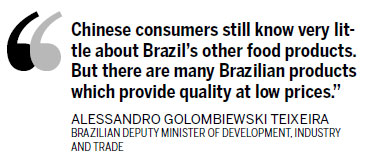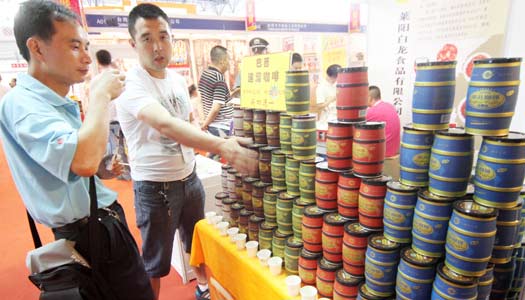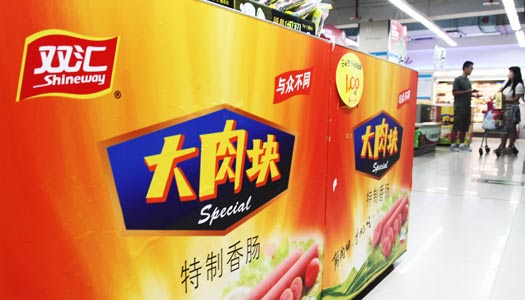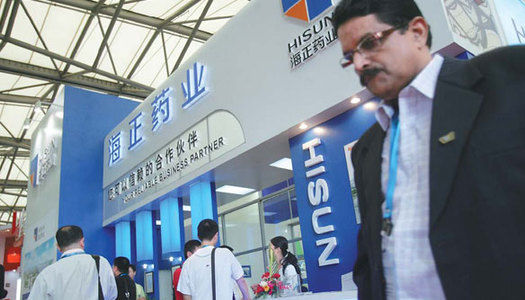
Trade links deepen between China and Brazil
Updated: 2012-11-21 08:09
|
An attendee of a trade show in Beijing in June tries a sample of Brazilian instant coffee. Wu Changqing / for China Daily |
Brazilian officials are visiting China to expand business between the two countries, especially in the food and drink sector.
According to Alessandro Golombiewski Teixeira, Brazilian deputy minister of Development, Industry, and Trade, the two countries have common interests in improving agricultural trade, which will help satisfy China's growing demand for agricultural products and create more jobs in Brazil.
The South American country is the world's third-largest food exporter and China is the world's largest food consumer.

He made the remarks on Tuesday in Beijing while leading a delegation to promote Brazilian agricultural products, including beef, coffee, honey and wine. He also revealed that more than 400 meetings between companies from both countries have been set up during this visit.
China has been one of the top buyers of Brazilian farm products in recent years.
More than one-third of China's soybean imports came from Brazil last year, making it the second-largest soybean supplier to the market after the United States.
Chinese demand for other Brazilian agricultural products is also rising.
Brazilian government data show that in first 10 months of this year, China imported 1.8 million metric tons of Brazilian sugar, for instance, making it the country's top sugar buyer, accounting for 12 percent of Brazil's total sugar exports.
"Chinese consumers still know very little about Brazil's other food products," Teixeira said. "But there are many Brazilian products which provide quality at low prices," he added.
Industry analysts say China's growing demand for food imports is mainly driven by its ongoing urbanization and increasing population, and that closer ties with Brazil could help diversify its import suppliers.
"Trade with Brazil could prevent China from becoming over-reliant on a single country, such as the US," said Ma Wenfeng, a senior analyst at Beijing Orient Agribusiness Consultant Ltd.
In the meantime, growing trade with Brazil will encourage bilateral investment and accelerate the development of China's agricultural industry in the long run, added Zhang Monan, an economist with the Economic Forecast Department of the State Information Center.
Zhang also said that agricultural trade could help further strengthen commercial ties between the two emerging markets, especially in light of continued economic uncertainty around the world.
"Given China's status as the world's second-largest economy, it needs better trade and economic cooperation with emerging markets to maintain the high growth of its export sector," Zhang said.
China outstripped the US to become the largest exporter to Brazil this year. During the first 10 months, China's exports to Brazil grew by 6.2 percent from a year earlier to $28.7 billion.
Meanwhile, its annual imports from Brazil have declined 5.2 percent to $35.2 billion, according to official Brazilian data.
Trade experts and analysts expect Brazil's surplus with China to hit $7.5 billion this year.
- BYD exports three electric cars to Thailand
- Grid gets first jolt of residential solar power
- US now largest buyer of China's exports
- China's outbound M&As on the rise
- Tobacco control may entail price, tax rises
- Quanzhou becomes pilot financial reform zone
- New automobiles shine at Geneva Motor Show
- World's longest high-speed rail 'on track'
- Jiugui Liquor involved in plasticizer scandal again
- Accident reignites school bus safety concerns
- China to revise labor law
- Trademark registration under scrutiny
- Dinner ban takes toll on liquor firms
- CIC tables bid for London's Chiswick Park
- Property buyers eye overseas market
- Call for law to protect personal information
- China to cut train ticket prices
- Christmas business
- Solar industry to get jolt from new policies
- KFC chicken under spotlight















